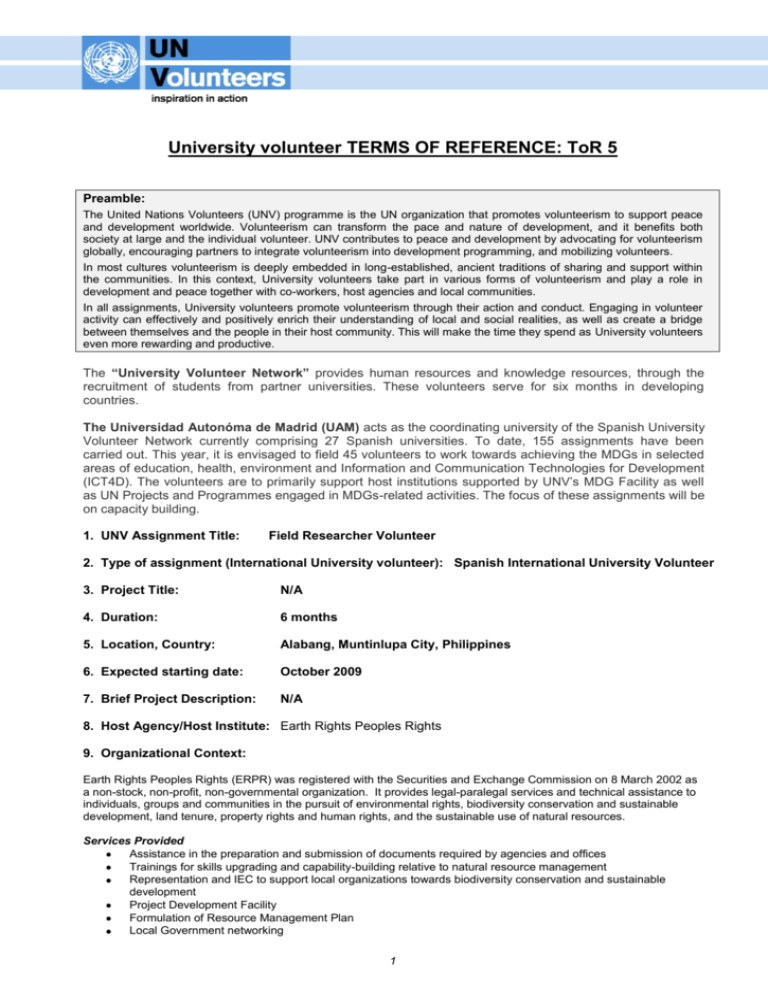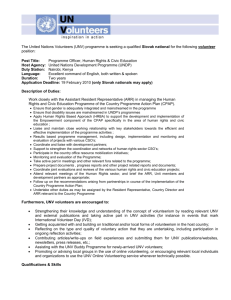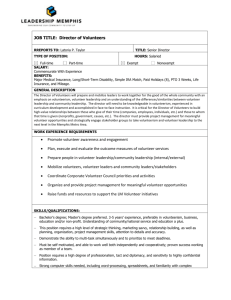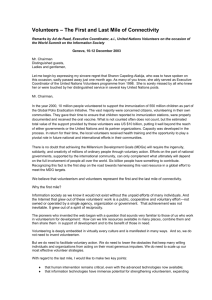University volunteer TERMS OF REFERENCE: ToR 5
advertisement

University volunteer TERMS OF REFERENCE: ToR 5 Preamble: The United Nations Volunteers (UNV) programme is the UN organization that promotes volunteerism to support peace and development worldwide. Volunteerism can transform the pace and nature of development, and it benefits both society at large and the individual volunteer. UNV contributes to peace and development by advocating for volunteerism globally, encouraging partners to integrate volunteerism into development programming, and mobilizing volunteers. In most cultures volunteerism is deeply embedded in long-established, ancient traditions of sharing and support within the communities. In this context, University volunteers take part in various forms of volunteerism and play a role in development and peace together with co-workers, host agencies and local communities. In all assignments, University volunteers promote volunteerism through their action and conduct. Engaging in volunteer activity can effectively and positively enrich their understanding of local and social realities, as well as create a bridge between themselves and the people in their host community. This will make the time they spend as University volunteers even more rewarding and productive. The “University Volunteer Network” provides human resources and knowledge resources, through the recruitment of students from partner universities. These volunteers serve for six months in developing countries. The Universidad Autonóma de Madrid (UAM) acts as the coordinating university of the Spanish University Volunteer Network currently comprising 27 Spanish universities. To date, 155 assignments have been carried out. This year, it is envisaged to field 45 volunteers to work towards achieving the MDGs in selected areas of education, health, environment and Information and Communication Technologies for Development (ICT4D). The volunteers are to primarily support host institutions supported by UNV’s MDG Facility as well as UN Projects and Programmes engaged in MDGs-related activities. The focus of these assignments will be on capacity building. 1. UNV Assignment Title: Field Researcher Volunteer 2. Type of assignment (International University volunteer): Spanish International University Volunteer 3. Project Title: N/A 4. Duration: 6 months 5. Location, Country: Alabang, Muntinlupa City, Philippines 6. Expected starting date: October 2009 7. Brief Project Description: N/A 8. Host Agency/Host Institute: Earth Rights Peoples Rights 9. Organizational Context: Earth Rights Peoples Rights (ERPR) was registered with the Securities and Exchange Commission on 8 March 2002 as a non-stock, non-profit, non-governmental organization. It provides legal-paralegal services and technical assistance to individuals, groups and communities in the pursuit of environmental rights, biodiversity conservation and sustainable development, land tenure, property rights and human rights, and the sustainable use of natural resources. Services Provided Assistance in the preparation and submission of documents required by agencies and offices Trainings for skills upgrading and capability-building relative to natural resource management Representation and IEC to support local organizations towards biodiversity conservation and sustainable development Project Development Facility Formulation of Resource Management Plan Local Government networking 1 OFFICE OPERATIONS The ERPR office is located at Unit 7 D Westgate Tower, 1709 Investment Drive, Madrigal Business Park, Ayala Alabang, Muntinlupa City. It is about seven kilometers from the international and domestic airports, a half hour drive in normal traffic. It is eleven kilometers from Makati City – EDSA-MRT, less than half an hour drive in normal traffic. It is five minutes from the Alabang Bus and Jeep terminals with destinations to northern Luzon and southern Luzon. It is less than an hour drive to the Coastal Road – Baclaran Bus and Jeep terminals with destinations to the ports of Manila and LRT. Communication is satisfactory, with internet access in place. Several lodging houses near the office with reasonable rates are utilized for those who require lodging due to workload and remote destinations. ASSISTED GROUPS The indigenous peoples sector is the most assisted group of ERPR, followed by fisherfolk communities and upland farmers. Local government officials have recently joined the groups assisted by ERPR, primarily those with large populations of IPs, upland dwellers and coastal communities. ERPR Website: http://earthrightspeoplesrights.org ERPR Brochure: www.undp.org.ph/UNV/ERPR Brochure.pdf Photo 1 (ERPR staff in office): www.undp.org.ph/UNV/ERPR 005.jpg Photo 2 (Field project site): www.undp.org.ph/UNV/010120071291-003.jpg Photo 3 (Field project site): www.undp.org.ph/UNV/DSC00158-001.jpg 10. Description of Duties: The volunteer will be supporting the following area(s) of the MDGs. Eradicate extreme poverty and hunger Achieve universal primary education Promote gender equality and empower women Reduce child mortality Improve maternal health Combat HIV/AIDS malaria and other diseases Ensure environmental sustainability Global partnership for development NB The University Volunteer will undertake the following tasks: Collect photographs and identify environmentally significant flora and fauna from assigned project sites. Compile flora and fauna photographs with correct scientific name, local names and basic description. Liaise with local stakeholders in the course of field assignments, particularly highlighting the purpose and objective of the activity and the specific actions that will be undertaken by the volunteer while in the area. Actively contribute to the overall organization effort in natural resource management Contribute to knowledge building and sharing. Perform all other auxiliary functions as may be required in the pursuit of the organization’s functions. In addition University volunteers are encouraged to further promote volunteerism and engage in volunteering activities: Strengthening their knowledge and understanding of the concept of volunteerism by reading relevant UNV and external publications and taking active part in UNV activities (for instance in events that mark IVD); Getting acquainted with and building on traditional and/or local forms of volunteerism in the host country; 2 Reflecting on the type and quality of voluntary action that they are undertaking, including participation in ongoing reflection activities; Assisting with the UNV Buddy Programme for newly-arrived University volunteers; Promoting or advising local groups in the use of online volunteering, or encouraging relevant local individuals and organizations to use the UNV Online Volunteering service whenever technically possible; and Contributing articles/write-ups on field experiences and submitting them for UNV publications/websites, newsletters, press releases, etc. 11. Results/Expected Output: Compilation of validated flora and fauna list for at least 3 project sites in digital format Concise field notes for each project site containing results of basic environmental scanning A concept note for a possible resource management program 12. Qualifications/Requirements: Education: Enrolment in post-graduate studies in Tropical Biology/Ecology, Biology, Ecology, Wildlife Biology/Ecology, Field Biology/Ecology, Forestry and other related fields Language: Proficiency in English is required Specific skills in requested area (e.g. related to education, health, environment or ICT4D): Excellent photography skills. Good working knowledge of tropical flora and fauna nomenclature. Computer/software skills: Average computer skills, with good working knowledge of MS Office Applications and other photo editing and/or camera-specific software Additional skills: Excellent communication skills; Excellent interpersonal skills; High level of professionalism; Tolerance and acceptance of cultural differences different from your own; Resourcefulness and creativity Stress management skills; Problem solving skills; and Time management skills. Patience, willingness to work long hours, and, most importantly, passion are required at all aspects of day-to-day operations. Candidates are expected to have a good understanding of the issues and concerns of middle-income countries such as the Philippines, at the international, national and local levels. ERPR’s projects are mostly with Indigenous Peoples Communities. Thus, candidates must be sensitive to the culture of each of the Indigenous Peoples Communities they will be assigned to work with. Also, ERPR regularly deals with officials from Local Government Units and other government agencies. Candidates are expected to exhibit professionalism and flexibility in dealing with these agencies. ERPR’s project sites are outside of Metro Manila. Majority are located in remote rural communities, outside major towns/cities. If assigned on field, candidates must be able to work with very basic facilities, modest accommodations, limited telecommunication facilities and limited available transportation. Candidates are likewise advised to consult with their physicians for possible allergies 3 and other health-related concerns so they can bring proper medication and take necessary precautions. Candidates must have no serious medical condition (e.g. heart and respiratory problems, etc), as medical facilities are often inaccessible from project sites. 14. Other information: A) Visa Please specify type of visa needed for nationals from Spain to enter your country: Tourist visa (if yes, return ticket needed) No visa or visa upon arrival at airport Visa before departure (UNV Philippines will arrange visa for the volunteer) B) Accommodation Location of assignment: at least 3 ERPR Project sites (to be determined) with periodic duties at ERPR Office Nearest airport: Ninoy Aquino International Airport (Manila) Type of accommodation: Own/shared apartment. Prior to arrival of the volunteer, ERPR will recommend affordable, secure apartments that are near the ERPR office and meet Minimum Operating Security Standard (MOSS). Address: Unit 7 D Westgate Tower, 1709 Investment Drive, Madrigal Business Park, Ayala Alabang, Muntinlupa City, 1780, Philippines Approximate monthly cost of accommodation: approximately Euro 400 (cost will be lower for shared accommodation); cheaper accommodation might be available but will entail longer travel time and possible additional transportation cost. Some service/facilities/utilities might not be available in some cheaper accommodations. Security provision and approximate costs: To be determined following assessment conducted by UN Department of Security and Safety. Means of local transport for the volunteer: Public transportation, such as bus, taxi, jeepney (http://en.wikipedia.org/wiki/Jeepney), train, and tricycle. Domestic airlines will be used when assigned on project sites in Panay Island. What other facilities will be offered to the University volunteer(s)Telephone (for calls within the Philippines only), internet access during office hours, office equipments can be shared by ERPR staff with the volunteer such as desk top computer, printer, copy & fax machines . Bringing of own laptop computer is highly recommended. C) Local transportation Means of local transportation for the volunteer: Public transportation, such as bus, taxi, jeepney (http://en.wikipedia.org/wiki/Jeepney), train, and tricycle. Domestic airlines will be used when assigned on project sites in Panay Island. Approximate monthly cost: Duty in ERPR office: approximately Euro 30 per month for transportation expenses only Field Assignments: approximately Euro150 per field assignment for transportation expenses only Note: Cost of food and other expenses will depend on the preference of the candidate. However, a monthly budget of Euro 200 might be enough based on average cost of food and other personal 4 requirements. During field assignments, costs may vary, but the average Per Diem rate of approximately Euro 40 (inclusive of food and accommodation) will be sufficient. D) Security provision Security provision and approximate costs: To be determined following assessment conducted by UN Department of Security and Safety. 15. Conditions of Service Monthly volunteer stipend (intended to cover housing, basic needs and local transport), equivalent to EUR 683 per University volunteer; visa fees, life and health insurance; return airfares. Date 16 March 2009 5





